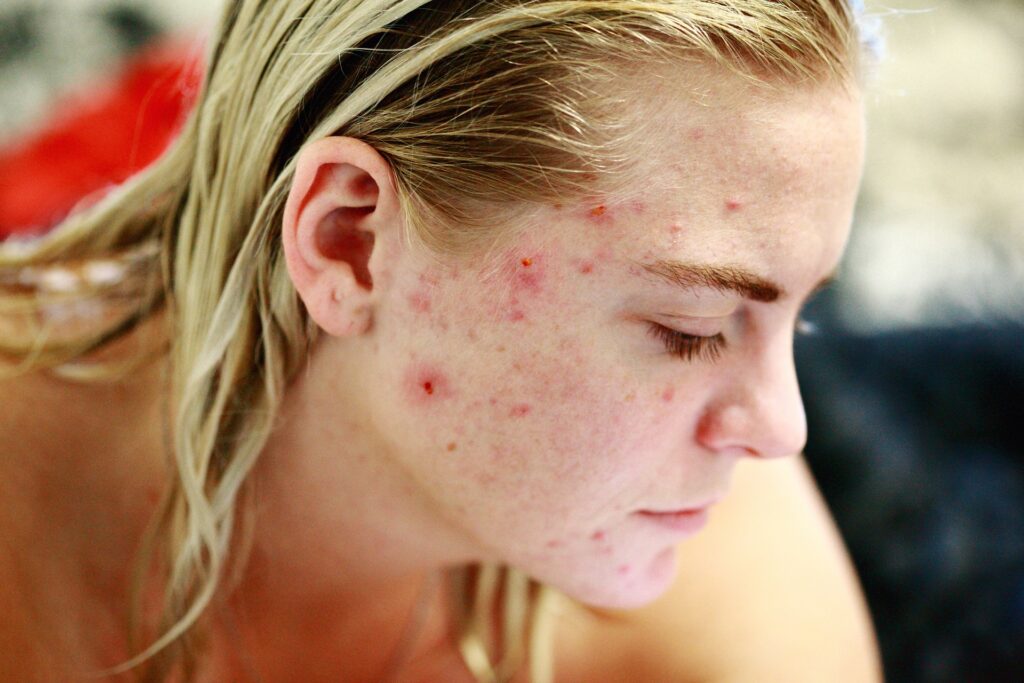Acne Vulgaris: Understanding Causes and Treatment

Acne Vulgaris | Causes and Treatment
Introduction
Acne vulgaris, commonly known as acne, is a skin condition that affects millions of people worldwide. Understanding its causes and treatment options is crucial for effectively managing this often troublesome condition.
Understanding Acne Vulgaris
Acne vulgaris appears in different types, such as whiteheads, blackheads, papules, pustules, nodules, and cysts. It mainly impacts areas with a high concentration of sebaceous glands, like the face, neck, chest, and back.
Causes of Acne Vulgaris
Hormonal Changes
Hormonal fluctuations, particularly during puberty, menstruation, pregnancy, and menopause, can stimulate the sebaceous glands, leading to excess oil production and clogged pores.
Genetics
Genetic predisposition plays a significant role in acne development. If one or both parents had acne, there’s a higher likelihood of experiencing it as well.
Lifestyle Factors
Unhealthy habits such as poor diet, inadequate skincare routines, and smoking can exacerbate acne symptoms.
Triggers of Acne Vulgaris
Diet
Consumption of high-glycemic foods, dairy products, and excessive intake of processed sugars can trigger acne flare-ups in susceptible individuals.
Stress
Stress stimulates the production of cortisol, a hormone that can increase oil production and inflammation in the skin, worsening acne symptoms.
Skincare Products
Certain skincare products containing comedogenic ingredients or harsh chemicals can irritate the skin and exacerbate acne.
Treatment Options
Over-the-Counter Remedies
Items with benzoyl peroxide, salicylic acid, or alpha hydroxy acids can assist in clearing pores and decreasing inflammation.
Prescription Medications
Topical retinoids, antibiotics, and oral contraceptives may be prescribed by dermatologists to target severe acne cases.
Lifestyle Changes
Adopting a healthy diet, staying hydrated, and practicing good skincare habits can complement medical treatments and prevent acne recurrence.
Preventive Measures
Skincare Routine
Regular cleansing, exfoliation, and moisturizing with non-comedogenic products can help maintain clear skin.
Diet and Nutrition
Incorporating foods rich in antioxidants, vitamins A, C, and E, and omega-3 fatty acids can support skin health and reduce inflammation.
Stress Management
Practicing relaxation techniques such as yoga, meditation, and deep breathing exercises can help reduce stress levels and minimize acne breakouts.
Natural Remedies
Tea Tree Oil
Known for its antimicrobial properties, tea tree oil can help kill acne-causing bacteria and reduce inflammation when applied topically.
Aloe Vera
Aloe vera gel possesses soothing and anti-inflammatory properties, making it an effective natural remedy for calming irritated skin.
Honey and Cinnamon
A combination of honey and cinnamon can be used as a mask to cleanse pores, reduce inflammation, and promote healing.
Professional Treatments
Chemical Peels
Chemical peels containing alpha hydroxy acids or beta hydroxy acids can exfoliate the skin, unclog pores, and improve overall skin texture.
Microdermabrasion
Microdermabrasion involves exfoliating the outer layer of the skin to remove dead skin cells, oil, and debris, resulting in smoother and clearer skin.
Laser Therapy
Laser treatments target acne-causing bacteria and reduce oil production, leading to significant improvements in acne severity.
Managing Acne Scarring
Dermatological Procedures
Procedures such as microneedling, dermal fillers, and laser resurfacing can effectively treat acne scars and improve skin texture.
Home Remedies
Natural remedies like lemon juice, apple cider vinegar, and rosehip oil can help fade acne scars over time with consistent use.
Impact of Acne Vulgaris
Acne vulgaris not only affects physical appearance but also takes a toll on emotional well-being, causing anxiety, depression, and low self-esteem.
Myths Surrounding Acne Vulgaris
Chocolate and Greasy Foods
Contrary to popular belief, consuming chocolate and greasy foods does not directly cause acne. However, a balanced diet is essential for overall skin health.
Poor Hygiene
Acne is not caused by dirty skin alone. Over-washing or scrubbing the skin vigorously can actually worsen acne by irritating the skin.
Tips for Clearing Acne
Gentle Cleansing
Avoid harsh cleansers and abrasive scrubs that can strip the skin of its natural oils and disrupt its protective barrier.
Hydration
Drink plenty of water to keep the skin hydrated and help flush out toxins that can contribute to acne formation.
Sun Protection
Use a non-comedogenic sunscreen with an SPF of 30 or higher to protect the skin from harmful UV rays and prevent post-inflammatory hyperpigmentation.
Consulting a Dermatologist
Seeking professional advice from a dermatologist is crucial for accurate diagnosis and personalized treatment plans tailored to individual skin types and concerns.
Conclusion
Understanding the causes and treatment options for acne vulgaris is essential for effectively managing this common skin condition. By adopting a holistic approach that includes lifestyle modifications, skincare routines, and professional treatments, individuals can achieve clearer and healthier skin.
FAQs
- What foods should I avoid to prevent acne?
- While there’s no one-size-fits-all answer, avoiding high-glycemic foods and dairy products may help reduce acne flare-ups in some individuals.
- Is acne vulgaris contagious?
- No, acne vulgaris is not contagious and cannot be transmitted from person to person through physical contact.
- Can stress worsen acne?
- Yes, stress can exacerbate acne symptoms by triggering hormonal changes that increase oil production and inflammation in the skin.
- How long does it take for acne treatments to work?
- The efficacy of acne treatments differs from one individual to another. Some may see improvement within a few weeks, while others may require several months of consistent treatment.
- Are there any long-term side effects of acne medications?
- While most acne medications are safe when used as directed, some may cause side effects such as dryness, irritation, or increased sensitivity to sunlight. It’s essential to discuss potential risks and benefits with a healthcare provider before starting any treatment regimen.